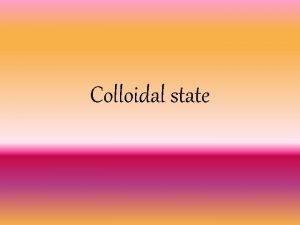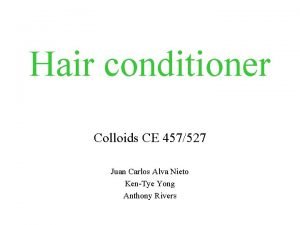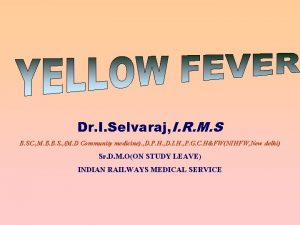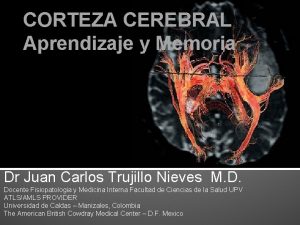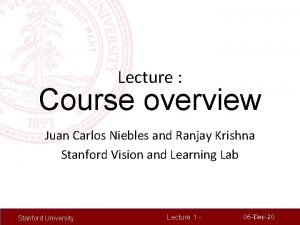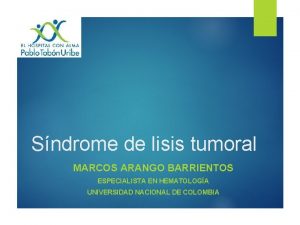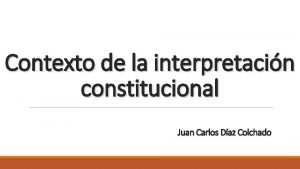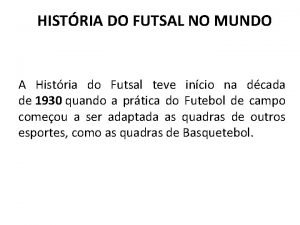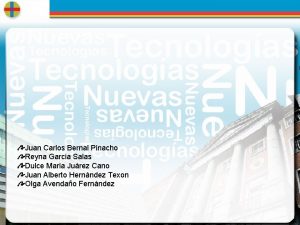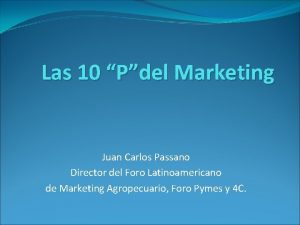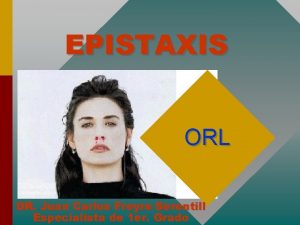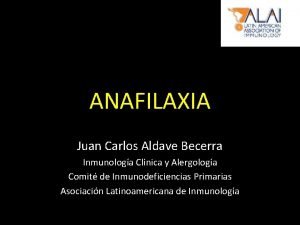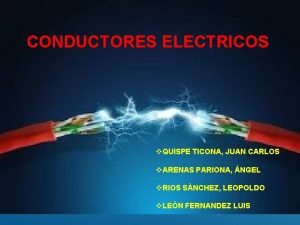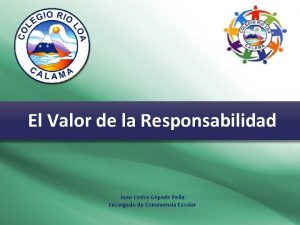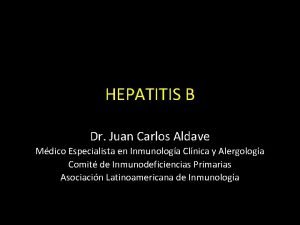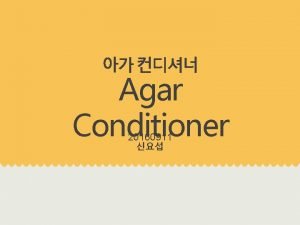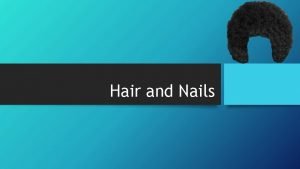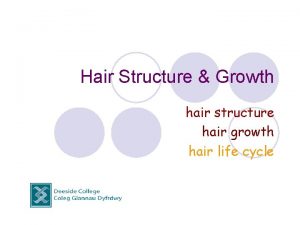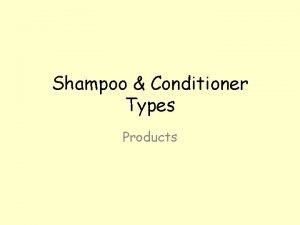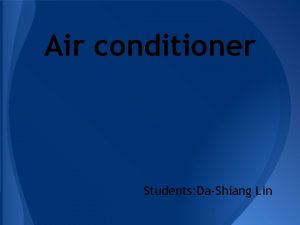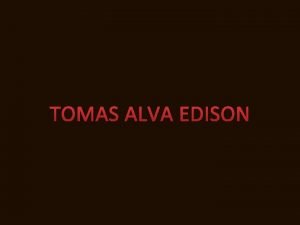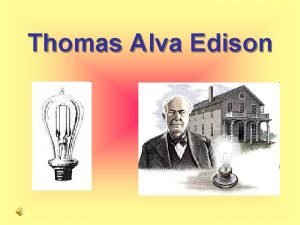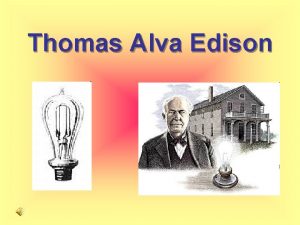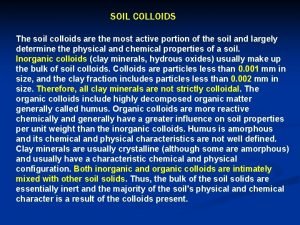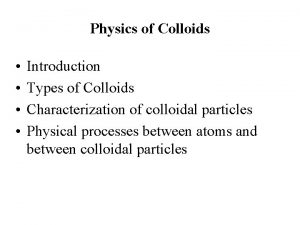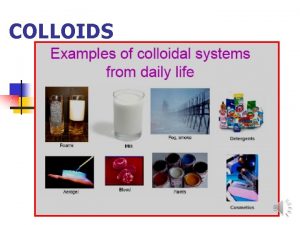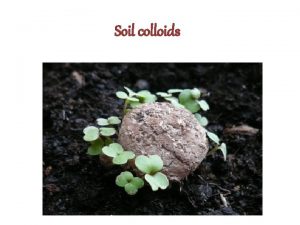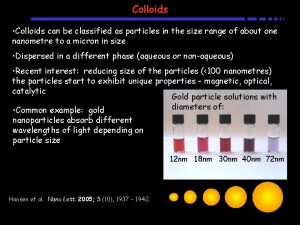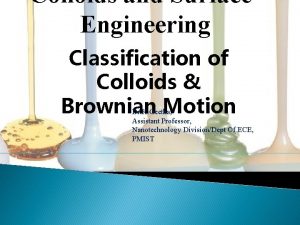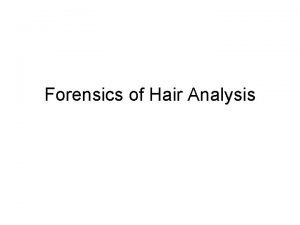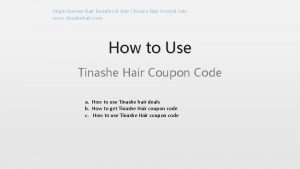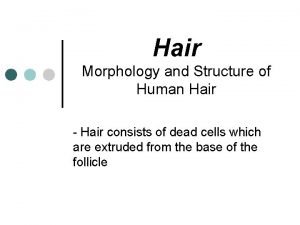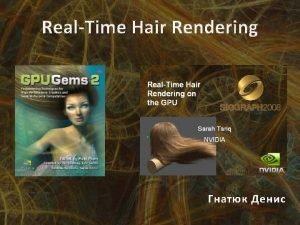Hair conditioner Colloids CE 457527 Juan Carlos Alva


























- Slides: 26

Hair conditioner Colloids CE 457/527 Juan Carlos Alva Nieto Ken-Tye Yong Anthony Rivers

What is hair conditioner? • To restore hair to its natural state • Undo damage by giving better look • Containing cationic surfactants in combination with long chain fatty alcohol and other lipid components. • leave the hair to be soft, shiny and manageable

Hair conditioner as consumer product Safety concern • Toxicity • Eyes injuries • Irritation to the skin Colorants • Visual appealing Preservation of consumer products • Microbial contamination • Spread of disease

Hair composition • Morphological • • Cortex, Cuticle, Medulla. Intercellular cement • Chemical • 19 proteins: – – Cystine Keratin Glutamic acid. Leucine, etc.

Interactions of surfactants and polymer with hair Three main types of interactions: • Primary valence bonds (ionic and covalent bonds) • Polar interactions (Hydrogen bonds) • Dispersion forces (van der waals attractions)

Emulsions • Emulsion • Mixture liquid / liquid • Surfactant / amphiphilic. • “Water in oil” W/O or “Oil in Water” O/W. • Microemulsion • • Spontaneous formation. Thermod stability. High solubilization capacity. Clear appearance. Oil in Water O/W. Water in Oil W/O

Microemulsions and foams • Microemulsions • Liquid / liquid. • Stability – Second surfactant. – Proteins, glucosoides, lipoids, sterols. – Size bubble. • Foams • • Liquid / gas. Micronic layer Microscopic bubbles. Stability – Second surfactant. – Viscosity / liquid. – Proteins (Saponin, etc)

Reconstructer – Water-based • Microemulsion • Foam. – Solubilized proteins and amino acids. • Rebuilding blocks, -hair components-. • Carry and deposit in the hair surface. – Benefits. – Flexibility. – Repair damage. – Reduction in splits ends.

Formulation – Hair conditioner composition Anionic emulsifiers Glycerol stearate 1. 5 % Wt Cetyl alcohol 3 % Wt Lubricant additives Stearyl dimethicone 4 % Wt Humectants Glycerin 1. 5 % Wt Propylene glycol 1. 5 % Wt Preservatives Metyl paraben 0. 30 % Wt Carrier Deionized water 87 % Wt Fragance Not established.

Formulation – Reconstructer composition Hydrolyzed proteins Keratin, hydrogenated soy, yeast, wheat germ glycerides. Amino acids Cystine, aspartic acid, lauryl glutamate. Biological additives Casein, beer, eggs, nettle extract, etc. Other Vitamins B-12, Inositol, Paba, and Iron.

Adsorption • How the reconstructer works? • • Attachment of the hair conditioner – fundamental. Adsorption is very important. (large species). Low enough molecular weight proteins Penetrate and reconstruct hair fibers.

Detanglers Objectives and purpose • • • Removes tangles from hair Straighten curly and wavy hair Able to last for a long period Improve the texture of hair Easier to comb Imparts and glass like shine to hair

Ingredients used in detanglers De-ionized water (94. 6 % wt) 1 -hexadecanol (co-surfactant) (2. 5 % wt) Glycerin (humectants) (0. 5 % wt) Stearalkonium chloride (cationic surfactant) (1. 5 % wt) Citrus acid (acidifiers) (0. 4% wt) Colorants (0. 2 % wt) Fragrance (oil) (0. 3 % wt)

Functions of ingredients Stearalkonium chloride (Cationic surfactants) • Positively changed nitrogen atom • allowed the cationic group to attach negatively charged surfaces • Neutralized the electrostatic charges on the hair 1 -hexadecanol (co-surfactant) • Act as solubilizers • To form better microemulsion • Thermodynamically stable system

Functions of ingredients Glycerin (humectants) • Attracted to water • Penetrate the cuticle • Stabilize the moisture content within the hair shaft • Soften and swell dry brittle hair Citrus acid (acidifiers) • Dissolve the soap residue on the hair • eliminate greasy, sticking feeling caused by dirt

Making procedure • Oil-in-water emulsion (O/W) • Dissolve water-soluble ingredients. – 60% water – Heat & Stirring. • Dissolve oil-soluble ingredients. – Heat / melt solids. • • Keep stirring -10 / 15 min-. Add the remained water. Cool, add preservative and fragrance. Adjust p. H and viscosity.

Packaging reconstructers. • Bottle. • Used for the microemulsion. • Pump finger foamer. • • • Instant foaming action (foam). Mixture liquid/air No chemical propellant PET Easy to operate

Ingredients in Moisturizer • • deionized water hetoxide G-26 Methyl Paraben disodium EDTA Hest CSO Hetol G Hetol CA Hetamid MA 79. 03 % 3. 0 %. 15 %. 10 % 10. 0 % 2. 5 % 1. 0 %

Ingredients Continued • • Glyceryl Stearate. 70 % Hetoxamate SA-100. 70 % Cocoa Butter. 50 % Hest MS. 50 % Hetsorb L-20. 20 % Propyl Paraben. 05 % Kathon CG. 07 % Glycerol - thickening agent

Production Machinery

Process Diagram

Colloidal Attributes • Thickness – Makes hair thicker, fuller looking • Ability to stay in hair – Some conditioners you can leave in all day • Stability

Design Considerations • Make hair soft/manageable – Gives it that shine • Make hairs all lay the same way – Makes hair look smooth • Seals cuticle layer – Prevents frizzing • Prevent split ends

Surfactants used in Moisturizer • Ability to form micelle • Hydrophobic and hydrophilic parts • Form cross link

Marketing Considerations • Labeling – Tells active ingredients • Commercials – Shows results of using product • Different needs for different hairs – Sum need more moisture – Some for dyed, color treated hairs

Packaging • Materials used – Post consumer recycled plastics – Make containers soft, squeezable
 Suspension
Suspension Types of colloids
Types of colloids Is hair conditioner a colloid
Is hair conditioner a colloid Juan carlos zambrano art
Juan carlos zambrano art Juan carlos rossetti
Juan carlos rossetti Carlos juan finlay accomplishments
Carlos juan finlay accomplishments Sistema corticorrubroespinal
Sistema corticorrubroespinal Datrebil significado
Datrebil significado Juan carlos gualdron
Juan carlos gualdron Juan carlos olivares rojas
Juan carlos olivares rojas Olivier moindrot
Olivier moindrot Juan carlos niebles
Juan carlos niebles Juan carlos arango barrientos
Juan carlos arango barrientos Juan carlos diaz colchado
Juan carlos diaz colchado Juan carlos ceriani futsal
Juan carlos ceriani futsal Juan carlos garcia salas
Juan carlos garcia salas Juan carlos urizar
Juan carlos urizar Honoria borges
Honoria borges Juan carlos passano
Juan carlos passano Taponamiento anterior
Taponamiento anterior The place where futsal created in 1930 was in
The place where futsal created in 1930 was in Juan carlos aldave becerra
Juan carlos aldave becerra Tabla de conductores electricos
Tabla de conductores electricos Ies jc1
Ies jc1 Rafael arturo cepeda peña
Rafael arturo cepeda peña Juan carlos aldave
Juan carlos aldave Biografia juan carlos onetti
Biografia juan carlos onetti
